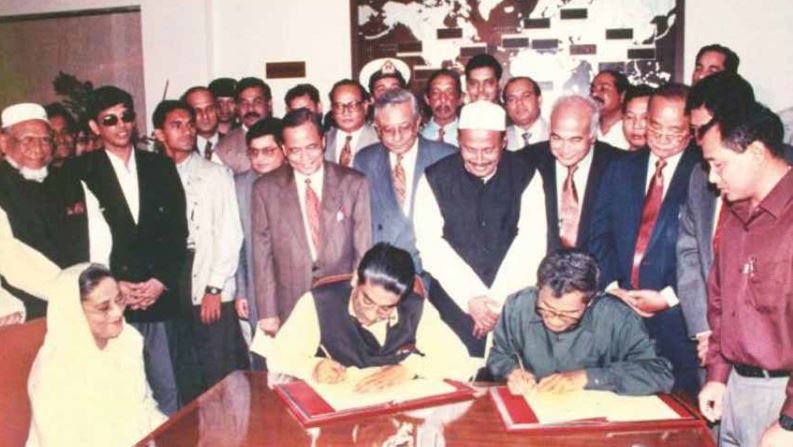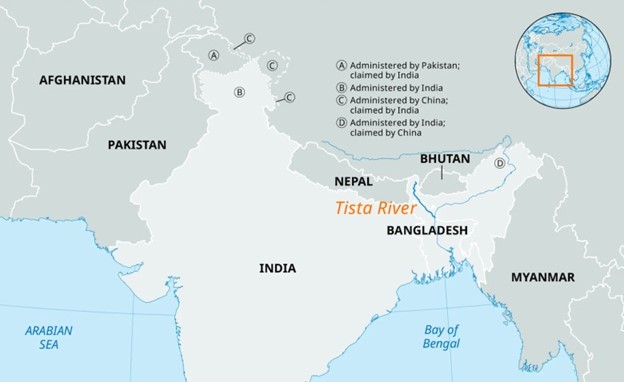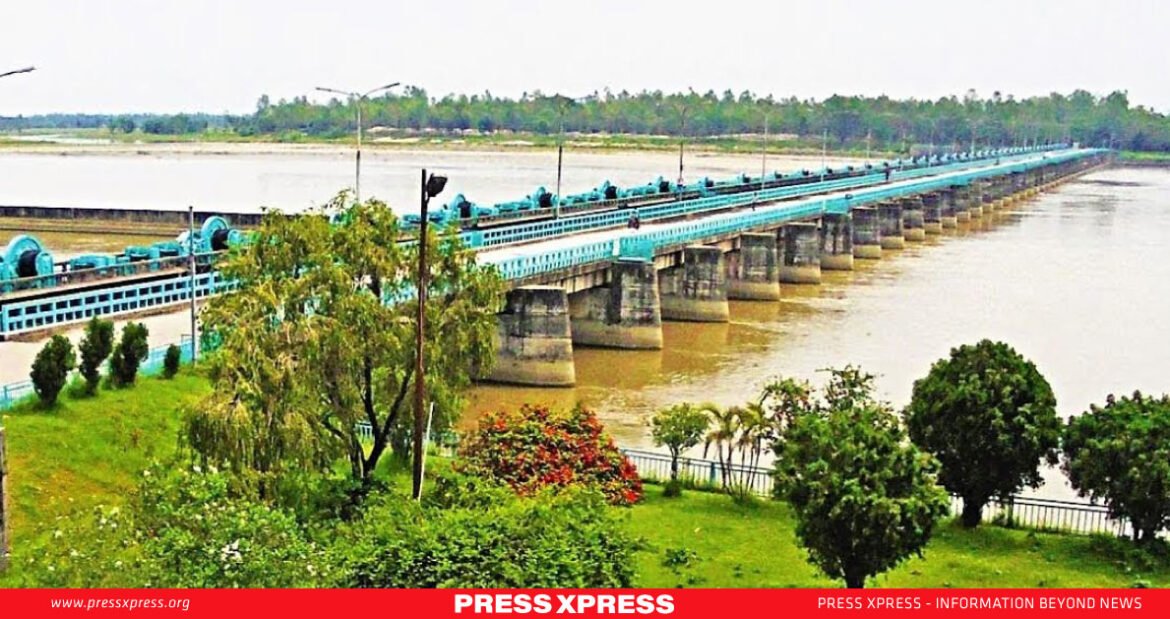Key Highlights:
- The Teesta basin supports approximately 30 million people, with 71% residing in northwest Bangladesh
- The BNP, under Khaleda Zia’s leadership, staunchly opposed The Ganges Water Sharing Treaty of 1996 and the Chittagong Hill Tracts Peace Accord of 1997
- Even the BNP attempted to influence China during its ‘India Out Campaign’ in Ramadhan
When Bangladesh became deeply concerned about the Teesta River water-sharing pact and also decided to restore the region’s ecological system and optimize the utilization of rainy season water during the dry season by preserving water in this basin, at that compound juncture, the Bangladesh Nationalist Party (BNP) plays against the national interest.
You Can Also Read: Why A Teesta Water-Sharing Treaty Remains Elusive
Following the recent visit of Sheikh Hasina to India, both India and China have now expressed their willingness to assist Bangladesh in addressing the Tessta River water conservation barrage construction challenges. China has formally submitted a proposal for its implementation. Now it appears that India has also become seriously interested in the project after delaying signing the Tessta River water-sharing agreement multiple times for several years due to objections from Mamata Banerjee.
Amidst the recent development of the Indian central government’s interest to come up with the water sharing agreement and also to participate in the water body management barrage project. Prime Minister Sheikh Hasina said, “As Bangladesh has a longstanding issue with India over the sharing of Teesta waters, it would be easy for Dhaka if the Teesta project is implemented by Delhi. As India has come forward, we think if we implement the Teesta project with India, we will not have to face problems regarding water every day. We will have that benefit,”
Her statement was issued following the Indian Prime Minister Narendra Modi when he said, ‘We have decided to start technical level discussions for renewal of the 1996 Ganga Water Treaty. A technical team will soon visit Bangladesh to discuss the conservation and management of the Teesta River in Bangladesh.’

In the phase of two key leaders’ diplomatic notes, the Bangladesh Nationalist Party (BNP) has entered dramatically and its party secretary general threatening to annul all treaties with India if they come to power. However, Prime Minister Sheikh Hasina has reaffirmed her stance on the crucial role of Indian assistance in implementing the Teesta River water-sharing project, dismissing claims that such collaborations undermine Bangladesh’s sovereignty.
Indeed, BNP’s stand has intensified its rhetoric. The BNP claims that the Awami League is making Bangladesh overly dependent on India and asserts that these agreements are against the country’s best interests. This stance reveals a troubling trend of the BNP leveraging nationalist sentiment to gain political mileage, despite their historical lack of opposition to Indo-Bangladeshi treaties during their tenures.
BNP’s Anti-Indian Sentiments: A Legacy of Hollow Diplomacy
The BNP’s stance against India has been apparent in various instances throughout Bangladesh’s history. Following the assassination of Bangabandhu Sheikh Mujibur Rahman and the subsequent political upheaval in 1975, anti-Indian sentiments resurged led by the BNP and they were reminiscent of Pakistan’s era when India was portrayed as the primary adversary.
During this resurgence, the military and strategic friendship treaty between Bangladesh and India, originally signed by Mujib and Indira Gandhi, was condemned by the BNP as “a treaty of slavery,” but didn’t take a single step to scarp, only voiced to generate this sentiment until the treaty expired in 1997.
This trend continued beyond 1996 by the BNP. The Ganges Water Sharing Treaty of 1996 and the Chittagong Hill Tracts Peace Accord of 1997 were seen as major achievements of the Hasina-led government.

However, the BNP, under Khaleda Zia’s leadership, staunchly opposed both agreements. They labeled the Ganges water-sharing treaty as exploitative and claimed that the Chittagong Hill Tracts had been surrendered to India through the peace accord. The BNP vehemently protested against these agreements, pledging to annul them if they returned to power.
Despite these threats, when the BNP assumed power after the 2001 general elections, it did not revoke these treaties. Throughout its history, the BNP has consistently opposed closer trade and communication ties with India, reflecting its enduring anti-Indian stance.
What is the BNP trying to Imply Now?
For the past 17 years, the BNP has struggled to regain power. Following its failure to secure a government position in the 2024 elections, the BNP is making vigorous efforts to sway public opinion by unnecessarily criticizing the goals and achievements of the Awami League.

If India successfully funds the Teesta project, it could significantly enhance bilateral relations with Bangladesh by addressing Dhaka’s persistent concerns regarding water scarcity and irrigation needs during the dry season. Both upstream and downstream communities rely on the Teesta for agricultural purposes, but the river struggles to meet water demands as India diverts its flow.
The Teesta basin supports approximately 30 million people, with 71% residing in northwest Bangladesh. As Bangladesh’s fourth largest river, the Teesta covers a floodplain of 1708 square miles and contributes to 14% of the nation’s total crop production. According to the International Food Policy Research Institute (IFPRI) in Washington, Bangladesh annually loses 1.5 million tons of Boro rice, equivalent to 8.9% of its total rice production, due to water shortages in the Teesta barrage area. These losses are expected to rise by 8% by 2030 and 14% by 2050.
However, the BNP is not seeing the benefits and is instead trying to dismantle further developments. Even the BNP attempted to influence China during its ‘India Out Campaign’ in the month of Ramzan. As a result, the BNP’s Foreign Relations Committee (FRC) and Standing Committee had indicated a shift towards prioritizing relations with China. This shift towards China, through demonizing India with which it has had a rocky relationship, could help the BNP appease China and convince them to increase relations with the party.
Moreover, by using anti-Indian tactics, the BNP is trying to appease hardliners and create fertile ground for Pakistan’s influence, which could harm India’s long-term security interests in the Indian North Eastern region. Despite their criticism, the BNP is failing to present viable alternatives that could match the potential benefits of the current government’s initiatives.
Hasina’s Pragmatic Approach
Beyond question, cooperation between Bangladesh and India is essential for managing the water resources of the Teesta River, which is vital for the agrarian economies in the northern regions of Bangladesh. Hasina’s stance is grounded in the principle of mutual benefit, emphasizing that such collaborations can lead to sustainable solutions for both nations.
Furthermore, Hasina’s diplomatic engagement with India underscores a broader vision of regional stability and economic integration. In an increasingly interconnected world, fostering good relations with neighboring countries is crucial for ensuring national security and economic growth. The Teesta project, therefore, is not merely a bilateral issue but a component of a larger framework aimed at regional development.
The BNP’s rhetoric against the Teesta River water-sharing project is a stark reminder of its legacy of hollow diplomacy. Instead of contributing to meaningful solutions, the BNP’s approach jeopardizes potential advancements in bilateral relations and regional stability. This pattern of anti-Indian sentiment is not new but a recurrent tactic to gain political mileage, which ultimately undermines Bangladesh’s long-term interests. The people of Bangladesh deserve a forward-looking vision that prioritizes sustainable development over divisive politics.
Amid calls to annul treaties with India, why hasn’t the BNP followed through on similar threats in the past?
In the past, Bangladesh National Party (BNP) have prioritized maintaining stable relations with India to avoid diplomatic isolation or economic repercussions. Political leaders often balance nationalist rhetoric with practical governance considerations, especially when in power. Bangladesh’s relationship with India is crucial for regional stability and cooperation. Annulment of treaties could lead to severe diplomatic fallout, complicating negotiations on border management, water sharing, and security issues. It’s important to state that canceling treaties with India is never a straightforward decision in terms of diplomacy. Whereas the Bangladesh National Party (BNP) have issued thinly veiled threats to scrap accords in those instances, its government is more mindful of national interest and will ensure a robust bilateral partnership with India for mutual gain. Development, peace and security, and combating global collective challenges require the support of international relations (diplomacy) Hence, regards to the treaties and international agreements arrived at by Bangladesh are a subject of delicate political consideration ensuring long-run advantages for Bangladesh along with its nationals.
– Bashir Ahmed,Professor, Department of Government and Politics, Jahangirnagar University



